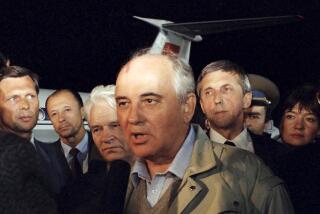Shevardnadze Recalls U.S. Bread Lines
NEW YORK — In a philosophical farewell after a two-week stay in the United States, Soviet Foreign Minister Eduard A. Shevardnadze gave Americans an overview of the state of perestroika, spiked with humor but with an undertone of warning.
Shevardnadze spoke to the New York-based Foreign Policy Assn., whose membership includes former Secretary of State Cyrus R. Vance and other government officials, industrialists and academics, on the eve of his departure Tuesday for Nicaragua. He left no doubt that the Soviet regime is in crisis.
He used what he called the U.S. “economic nose dive” of 1929 to describe the state of the Soviet economy today. He recalled the bread lines in New York’s Times Square and troops battling with the Bonus Army in Washington. He drew laughter with a reference to a 1931 Business Week report that 100,000 Americans wanted to emigrate to the Soviet Union.
The Soviet economy will recover, Shevardnadze said, as did America’s--after much difficulty.
He traced the origin of the Cold War to the dark days of the early 1930s. Communist theoreticians determined then, he said, that capitalism was doomed and could prolong itself only through military force, while in the West the thinking was reversed.
“The result was that both systems launched a massive effort to arm themselves,” he said, and the rivalry translated domestically into ideological purity campaigns: “witch hunts” by Sen. Joseph McCarthy in the United States and denunciations of “cosmopolitism” in the Soviet Union.
Where communism went wrong, he said, was in placing “enormous power” in the hands of the Soviet leaders. He said it was this rigid centralism that enabled the Soviet Union to fight World War II and rebuild afterward, but the price was the suppression of individual initiative and a stagnant economy.
Unprecedented Self-Criticism
Under Gorbachev, he said, the Soviet people have gone through an unprecedented era of self-criticism.
“We are filling the blank spots in our history,” he said, and he asked that Americans do the same.
He cited as a blank spot in U.S. history the use of atomic bombs against Japan in 1945. He said there was no military need to use them and that to do so was a political decision taken to intimidate Moscow.
“This tragedy of the century must be brought to light and its perpetrators globally denounced,” he said.
Shevardnadze spoke freely about Soviet problems, notably the surge of nationalism in a number of Soviet republics.
“The paradox is that the national energy that has been given free rein by perestroika (restructuring) is harmful to perestroika when it assumes radical exaggerated forms,” he said. “I believe that through dialogue at the level of federation, republics and other national entities, a dialogue which must be calm, respectful and constructive, we can resolve many inter-ethnic problems.”
The resolution of this internal tension, he said, will require a stronger national economy, economic independence of the republics and a “genuine rule of law.”
Turning to global problems, Shevardnadze said that “right before our eyes the world is sliding into a deep economic depression.” He listed as “signs of impending catastrophe” the massive Third World debt and the mounting cost of servicing it, which has stalled growth in poor countries.
U.S. and Soviet cooperation, he said, will be needed to rescue the world economy and to combat the drug problem and other social threats.
Issuing his strongest warning, he said: “To those who continue to ponder the problem of whether or not to help perestroika , I would like to say that if they think in terms of charity they are mistaken. We are not asking for that. Cooperation has to be mutually beneficial.”
He said Moscow is taking strong measures to facilitate economic cooperation with the United States.
More to Read
Sign up for Essential California
The most important California stories and recommendations in your inbox every morning.
You may occasionally receive promotional content from the Los Angeles Times.








